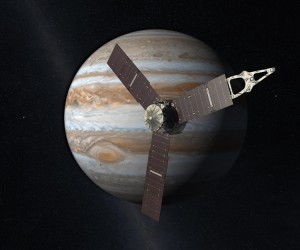Juno: Jumpin’ Jupiter!
July 5, 2016
Traditionally, Independence Day in the United States—yesterday, July 4—is celebrated with fireworks. This Fourth of July, the National Aeronautics and Space Administration (NASA) celebrated with fireworks of the deep space variety as its probe Juno fired its engine for 35 minutes to enter into orbit around Jupiter. After being launched in 2011, Juno has finally reached its destination.

Launched from Earth in 2011, the Juno spacecraft arrived at Jupiter on July 4, 2016, to study the giant planet from an elliptical polar orbit.
Credit: NASA/JPL
Jupiter is the largest planet in our solar system. It has a mass (amount of matter) that is greater than the masses of all the other planets in the solar system added together. Astronomers call Jupiter a gas giant because the planet consists mostly of hydrogen and helium, and it has no solid surface. Jupiter is named for the king of the gods in Roman mythology. Juno was Jupiter’s wife and queen of the gods.
Juno will study Jupiter from an elongated polar orbit. The probe will be 4,900 miles (7,200 kilometers) from Jupiter at the farthest point in its orbit, and dive to within 2,600 miles (4,200 kilometers) of the Jovian clouds, flying over the planet’s north and south poles. Mission scientists planned this orbit to keep Juno out of Jupiter’s radiation belts as much as possible. Jupiter emits a powerful magnetic field, much stronger than that produced by Earth. This strong magnetic field traps high-energy charged particles in belts around the planet. Any spacecraft entering these belts would be bombarded by huge doses of radiation. Such radiation is just as dangerous to electronics as it is to living things: it can damage computer chips and fry circuits.
Scientists shielded Juno’s most important electronics in a thick titanium case to protect them from radiation. But no spacecraft can stand exposure to such highly charged particles for long. NASA scientists do not expect the craft to survive much longer than its 20-month mission, even with its titanium vault and elliptical orbit. Consequently, they have already scheduled the probe to crash into Jupiter in February 2018.
Before it smashes into its object of study, Juno will probe the makeup of Jupiter. Scientists hope it will help determine whether Jupiter has a rocky core, and why the planet has a higher concentration of elements heavier than hydrogen and helium than the sun. Juno will also study Jupiter’s famous Great Red Spot, a storm that has been churning around the atmosphere for at least 300 years. Scientists think that answering these questions will help us better understand Jupiter’s history and the formation of our solar system. It may even give us a better idea of how other solar systems form and behave. Rather than a grand finale, Juno’s fireworks are the start of some amazing science!


